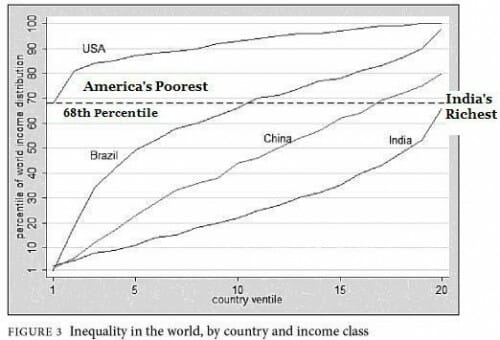Speaking of Income Distribution
This chart, from a book by Branko Milanovic via Carpe Diem reinforces a point about income distribution I make all the time - for all we talk about income distribution in this country, our poorest 20% would be middle class in many countries of the world. While I would love to see our poor doing even better, it begs the question of whether distribution or absolute prosperity is more important.

Just to give you a feel for reading the chart, the US's lowest ventile, or bottom 5%, have income that would put them in the 68th percentile worldwide. Our poorest 20% (the first 4 ventiles) would be upper middle class or better in Brazil, China, and India.
When comparing to European social democracies, it turns out that while the US's income distribution is wider, that is almost entirely due to the top end being higher. The poorest 10% make about the same as the poorest 10% in Europe, and I would argue that this analysis (from a leftish think tank) actually underestimates a quality of life advantage for American poor, who come out higher even than the middle class in Europe on things like living space and appliance ownership.
Perhaps more importantly than income inequality, income mobility remains high in this country. More on income inequality concerns here.
I think you're slightly off the mark here. Yes the European lower 10% are income wise (and certainly "what you get for your income" wise) probably more or less the same as the US lower 10%, they get free health care which in terms of "value-added" (and quality of life) would push them up quite a few percent against the US lower 10%.
True, "our poorest 20% would be middle class in many countries", but most people don't care about that; they only compare themselves to their compatriots.
Similarly, few middle-class Americans who howl "tax the rich" give substantial percentages of their income to people in poor countries, even if in global terms, they themselves are the rich.
As per David, the social support net in Europe is much denser than in the US so although living space may be cramped, this is true at almost
all social levels in Europe, the health care and income support is significantly higher than in the US. For a view of the bottom
in England the blog http://winstonsmith33.blogspot.com/ is interesting.
Yes, b/c all the latest, useless gadgets and having superfluous space are very important, more important than socialized medicine and mandated paid vacation, of say, at least 20 days/year in addition to the weekends and standard holidays. Yes, living in America is great, if you are a capitalist/scumbag/exploitive/greedy/ultra-competitive sociopath.
Income inequality is a red-herring and should be permanently abandoned as a measure of a country's economic well-being. Or, more accurately, income inequality should be held up as a measure of progress.
Think back to the caveman days. Tribe A and Tribe B are dragging their belongings along the ground and have equal wealth. Then Tribe A inventst the wheel and can accumulate more goods (i.e. weatlh). Well, income equality in the greater Cave Nation just increased. Is that bad.
Move forward to today. We pretty much all have that brother/uncle/high school friend who refuses to follow a product life path. In any circumstance that person is going to subsist. His income isn't going up no matter what. So, with the bottom held constant, any advances in wealth by the upper half due to improved producticity will drive nationwide income inequality. Yes, you can tax and transfer wealth to the bottom, but even that is not going to move the needle much. So if you have a society where the productive class is increasing it's wealth, you have increasing wealth/income inequality. The faster the country increases its wealth, the bigger the inequality gaps are going to be.
So, when someone tells you that the U.S. has the highest wealth/income inequality in the world, thank them for reminding you of the country's awesome ability to continually improve productivity.
The "lowest 10%" (and their immediate and, in many cases, extended family as well) in the USA, at least in my area, have access to full health care at no cost to them except for transportation to and from the provided clinics. This includes annual exams of all types, asssistance in preventive actions, and treatment when necessary. Such is probably, but I cannot say for certain, equal or better than the NHS. County-wide subsidized bus service door-door is available ($3.00) if requested 24 hours prior. Regardless, the local ER's are usually heavily used. And "free".
So, since the quality (or lack) of his/her comments are the same, "Jeremy" has moved from Althouse to here? Or it could be that is just a commonly used Name for the like-minded?
Value is subjective, sir. How do you know they would value their national health service more than the equivalent in cash?